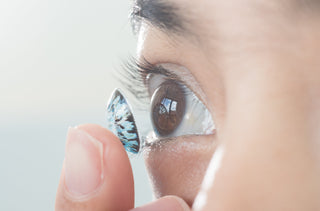Our bodies undergo many changes as we age, and our eyes are no exception. As we age, the risk of developing eye problems increases, which can affect our vision and, consequently, our quality of life. Fortunately, there are effective ways of preventing or slowing down these problems.
1. Adopt a healthy diet
What you eat has a direct impact on the health of your eyes. A diet rich in essential nutrients such as omega-3s, vitamins C and E, zinc and lutein can help prevent common age-related conditions such as age-related macular degeneration (AMD) and cataracts.
- Green leafy vegetables: Spinach, kale and other green vegetables are rich in lutein and zeaxanthin, two antioxidants that protect the retina.
- Oily fish: Salmon, tuna and sardines are rich in omega-3 fatty acids, which help prevent dry eyes and may slow the progression of AMD.
- Fruits and nuts: Oranges, kiwis, walnuts, and almonds are rich in vitamins C and E, which are beneficial for eye health.
2. Wear sunglasses
Exposure to the sun's ultraviolet (UV) rays can damage the eyes and increase the risk of developing cataracts and macular degeneration. To protect your eyes:
- Choose sunglasses with UV protection. Ensure they block 100% of UVA and UVB rays.
- Wear a wide-brimmed hat. In addition to sunglasses, a hat provides an extra layer of protection from the sun.
3. Have regular eye examinations
As we age, eye examinations become essential. An Optometrist can detect eye problems at an early stage, often before you even notice symptoms.
- Screening for AMD: An eye exam can identify the first signs of macular degeneration, enabling early treatment.
- Intraocular pressure monitoring can help detect glaucoma, a disease that can damage the optic nerve and lead to vision loss if left untreated.
- Cataract evaluation: Cataracts commonly cause blurred vision in the elderly, and surgery can often restore vision.
4. Stop smoking
Smoking is not only bad for your lungs but also for your eyes. Smokers run a much higher risk of developing cataracts, macular degeneration, and other age-related eye problems. Quitting smoking is one of the best things you can do to protect your vision.
5. Control your health conditions
Certain medical conditions, such as diabetes and high blood pressure, can increase the risk of eye problems, including diabetic retinopathy and vision loss due to high blood pressure.
- Control your blood sugar: If you have diabetes, it's crucial to maintain stable blood sugar levels to prevent eye complications.
- Monitor your blood pressure: Uncontrolled hypertension can lead to damage to the blood vessels in the retina.
6. Reduce digital eye strain
With the increasing use of screens, digital eye strain has become a common problem, even among the elderly. Eyestrain can cause headaches, blurred vision and eye pain.
- Follow the 20-20-20 rule: For every 20 minutes spent in front of a screen, look at something 20 feet away (about 6 meters) for 20 seconds.
- Adjust your screen: Make sure your screen is at a comfortable distance from your eyes, with ambient lighting that reduces glare.
7. Maintain an active lifestyle
Regular exercise contributes to general health and eye health. Good blood circulation is essential for the retina, and exercise helps maintain a healthy weight, reducing the risk of diabetes and hypertension, which are risk factors for eye disease.
Preventing age-related eye problems requires a proactive approach. By adopting a balanced diet, protecting your eyes from the sun, stopping smoking, and having regular eye examinations, you can keep your eyes healthy and preserve your vision. Don't forget that prevention is key and that it's essential to consult an optometrist for personalized eye health monitoring. Aging with good eyesight is possible if you care for your eyes today.





















































